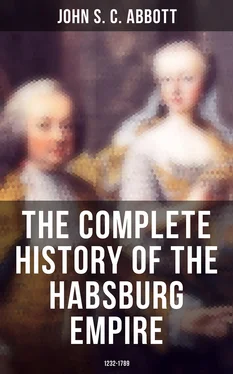The conduct of Frederic seems to be marked with increasing treachery and perfidy. Jealous of the growing power of George Podiebrad, he instigated Matthias, King of Hungary, to make war upon Bohemia, promising Matthias the Bohemian crown. Infamously the King of Hungary accepted the bribe, and raising a powerful army, invaded Bohemia, to wrest the crown from his father-in-law. His armies were pressing on so victoriously, in conjunction with those of Frederic, that the emperor was now alarmed lest Matthias, uniting the crowns of Hungary and Bohemia, should become too powerful. He therefore not only abandoned him, but stirred up an insurrection among the Hungarian nobles, which compelled Matthias to abandon Bohemia and return home.
Matthias, having quelled the insurrection, was so enraged with the emperor, that he declared war against him, and immediately invaded Austria. The emperor was now so distrusted that he could not find a single ally. Austria alone, was no match for Hungary. Matthias overran all Lower Austria, took all the fortresses upon the Danube, and invested Vienna. The emperor fled in dismay to Lintz, and was obliged to purchase an ignominious peace by an immense sum of money, all of which was of course to be extorted by taxes on the miserable and starving peasantry.
Poland, Bohemia and the Turks, now all pounced upon Hungary, and Frederic, deeming this a providential indication that Hungary could not enforce the fulfillment of the treaty, refused to pay the money. Matthias, greatly exasperated, made the best terms he could with Poland, and again led his armies in Austria. For four years the warfare raged fiercely, when all Lower Austria, including the capital, was in the hands of Matthias, and the emperor was driven from his hereditary domains; and, accompanied by a few followers, he wandered a fugitive from city to city, from convent to convent, seeking aid from all, but finding none.
CHAPTER V.
THE EMPERORS FREDERIC II. AND MAXIMILIAN I.
From 1477 to 1500.
Table of Contents
Wanderings of the Emperor Frederic.—Proposed Alliance with the Duke of Burgundy.—Mutual Distrust.—Marriage of Mary.—The Age of Chivalry.—The Motive inducing the Lord of Praunstein to declare War.—Death of Frederic II.—The Emperor's Secret.—Designs of the Turks.—Death of Mahomet II.—First Establishment of standing Armies.—Use of Gunpowder.—Energy of Maximilian.—French Aggressions.—The League to expel the French.—Disappointments of Maximilian.—Bribing the Pope.—Invasion of Italy.—Capture and Recapture.—The Chevalier De Bayard.
Adversity only developed more fully the weak and ignoble character of Frederic. He wandered about, recognized Emperor of Germany, but a fugitive from his own Austrian estates, occasionally encountering pity, but never sympathy or respect. Matthias professed his readiness to surrender Austria back to Frederic so soon as he would fulfill the treaty by paying the stipulated money. Frederic was accompanied in his wanderings by his son Maximilian, a remarkably elegant lad, fourteen years of age. They came to the court of the powerful Duke of Burgundy. The dukedom extended over wide realms, populous and opulent, and the duke had the power of a sovereign but not the regal title. He was ambitious of elevating his dukedom into a kingdom and of being crowned king; and he agreed to give his only daughter and heiress, Mary, a beautiful and accomplished girl, to the emperor's son Maximilian, if Frederic would confer upon his estates the regal dignity and crown him king. The bargain was made, and Maximilian and Mary both were delighted, for they regarded each other with all the warmth of young lovers. Mary, heiress to the dukedom of Burgundy, was a prize which any monarch might covet; and half the princes of Europe were striving for her hand.
But now came a new difficulty. Neither the emperor nor duke had the slightest confidence in each other. The King of France, who had hoped to obtain the hand of Mary for his son the dauphin, caused the suspicion to be whispered into the ear of Frederic that the Duke of Burgundy sought the kingly crown only as the first step to the imperial crown; and that so soon as the dukedom was elevated into a kingdom, Charles, the Duke of Burgundy, would avail himself of his increased power, to dethrone Frederic and grasp the crown of Germany. This was probably all true. Charles, fully understanding the perfidious nature of Frederic, did not dare to solemnize the marriage until he first should be crowned. Frederic, on the other hand, did not dare to crown the duke until the marriage was solemnized, for he had no confidence that the duke, after having attained the regal dignity, would fulfill his pledge.
Charles was for hurrying the coronation, Frederic for pushing the marriage. A magnificent throne was erected in the cathedral at Treves, and preparations were making on the grandest scale for the coronation solemnities, when Frederic, who did not like to tell the duke plumply to his face that he was fearful of being cheated, extricated himself from his embarrassment by feigning important business which called him suddenly to Cologne. A scene of petty and disgraceful intrigues ensued between the exasperated duke and emperor, and there were the marching and the countermarching of hostile bands and the usual miseries of war, until the death of Duke Charles at the battle of Nancy on the 5th of January, 1477.
The King of France now made a desperate endeavor to obtain the hand of Mary for his son. One of the novel acts of this imperial courtship, was to send an army into Burgundy, which wrested a large portion of Mary's dominions from her, which the king, Louis XI., refused to surrender unless Mary would marry his son. Many of her nobles urged the claims of France. But love in the heart of Mary was stronger than political expediency, and more persuasive than the entreaties of her nobles. To relieve herself from importunity, she was hurriedly married, three months after the death of her father, by proxy to Maximilian.
In August the young prince, but eighteen years of age, with a splendid retinue, made his public entry into Ghent. His commanding person and the elegance of his manners, attracted universal admiration. His subjects rallied with enthusiasm around him, and, guided by his prowess, in a continued warfare of five years, drove the invading French from their territories. But death, the goal to which every one tends, was suddenly and unexpectedly reached by Mary. She died the 7th of August, 1479, leaving two infant children, Philip and Margaret.
The Emperor Frederic also succeeded, by diplomatic cunning, in convening the diet of electors and choosing Maximilian as his successor to the imperial throne. Frederic and Maximilian now united in the endeavor to recover Austria from the King of Hungary. The German princes, however, notwithstanding the summons of the emperor, refused to take any part in the private quarrels of Austria, and thus the battle would have to be fought between the troops of Maximilian and of Matthias. Maximilian prudently decided that it would be better to purchase the redemption of the territory with money than with blood. The affair was in negotiation when Matthias was taken sick and died the 15th of July, 1490. He left no heir, and the Hungarian nobles chose Ladislaus, King of Bohemia, to succeed him. Maximilian had been confident of obtaining the crown of Hungary. Exasperated by the disappointment, he relinquished all idea of purchasing his patrimonial estates, but making a sudden rush with his troops upon the Hungarians, he drove them out of Austria, and pursued them far over the frontiers of Hungary. Ladislaus, the new King of Hungary, now listened to terms of peace. A singular treaty was made. The Bohemian king was to retain the crown of Hungary, officiating as reigning monarch, while Maximilian was to have the title of King of Hungary. Ladislaus relinquished all claim to the Austrian territories, and paid a large sum of money as indemnity for the war.
Читать дальше












